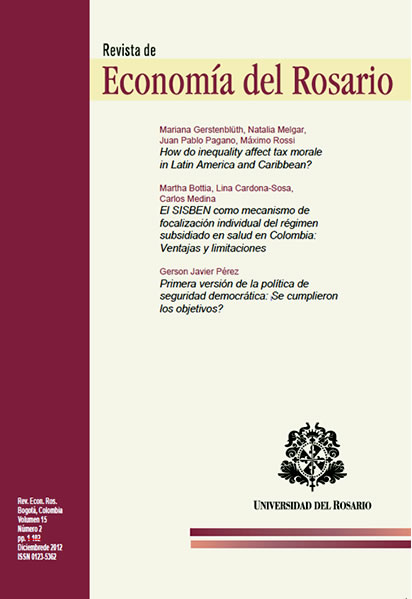How do inequality affect tax morale in Latin America and Caribbean?
Barra lateral del artículo
Sección
Artículos
Palabras clave:
Tax morale, corruption, inequality, democracy, macroeconomic performance
Contenido principal del artículo
Mariana Gerstenbluth
Departamento de Economía, Universidad de la República.
Natalia Melgar
Departamento de Economía, Universidad de la República
Juan Pablo Pagano
Departamento de Economía, Universidad de la República
Máximo Rossi
Departamento de Economía, Universidad de la República
Latin America is well known as an inequitable region. As it is recognized, inequality and corruption perception weaken the way that political institutions works and the democratic system. Focusing on Latin American and Caribbean countries, this paper analyzes what are the elements shaping tax morale. In particular, how the context influences ethical grounds decisions such as the predisposition to pay taxes is analyzed, using the survey carried out in 2005 by Latinobarometro. The objective is to analyze how country performance determines tax morale. To do so, four probit
models are estimated using Gini index, Transparency International Corruption Perception Index and Gross Domestic Product per capita (GDPpc) as explanatory variables. As expected we found that some socio-demographic variables play a relevant role. Interestingly, we also found that, in this attitude, LAC countries do not register a gender bias. However, those are not our main contributions to the literature on the field. The most important results are linked to: 1) the level
matters, GDPpc increases the probability of people having tax morale, 2) moreover, income distribution
also influence on tax morale but in opposite direction and 3) corruption perception also reduces tax morale. Those results show that the quality of institutions matters and therefore, the way that democracy works play a relevant role.
models are estimated using Gini index, Transparency International Corruption Perception Index and Gross Domestic Product per capita (GDPpc) as explanatory variables. As expected we found that some socio-demographic variables play a relevant role. Interestingly, we also found that, in this attitude, LAC countries do not register a gender bias. However, those are not our main contributions to the literature on the field. The most important results are linked to: 1) the level
matters, GDPpc increases the probability of people having tax morale, 2) moreover, income distribution
also influence on tax morale but in opposite direction and 3) corruption perception also reduces tax morale. Those results show that the quality of institutions matters and therefore, the way that democracy works play a relevant role.
Descargas
Los datos de descargas todavía no están disponibles.
Gerstenbluth, M., Melgar, N., Pagano, J. P., & Rossi, M. (2013). How do inequality affect tax morale in Latin America and Caribbean?. Revista De Economía Del Rosario, 15(2), 123-135. Recuperado a partir de https://revistas.urosario.edu.co/index.php/economia/article/view/2819
Mariana Gerstenbluth, Departamento de Economía, Universidad de la República.
Departamento de Economía, Universidad de la República.Natalia Melgar, Departamento de Economía, Universidad de la República
Departamento de Economía, Universidad de la RepúblicaJuan Pablo Pagano, Departamento de Economía, Universidad de la República
Departamento de Economía, Universidad de la RepúblicaMáximo Rossi, Departamento de Economía, Universidad de la República
Departamento de Economía, Universidad de la RepúblicaDetalles del artículo
Los autores conservan los derechos de autor y garantizan a la revista el derecho de ser la primera publicación del trabajo al igual que licenciado bajo una Creative Commons Attribution License que permite a otros compartir el trabajo con un reconocimiento de la autoría del trabajo y la publicación inicial en esta revista.
Artículos más leídos del mismo autor/a
- Ana I. Balsa, Máximo Rossi, Patricia Triunfo, Horizontal Inequity in Access to Health Care in Four South American Cities. , Revista de Economía del Rosario: Vol. 14 Núm. 1 (2011): enero-junio
- Marisa Bucheli, Maximo Rossi, Transmisión intergeneracional del castigo físico en la niñez , Revista de Economía del Rosario: Vol. 24 Núm. 1 (2021): 24-1
- Natalia Melgar, Máximo Rossi, Participación en campañas ambientales, es importante el efecto conjunto entre el ingreso subjetivo y el desempeño del país , Revista de Economía del Rosario: Vol. 15 Núm. 1 (2012): enero-junio



